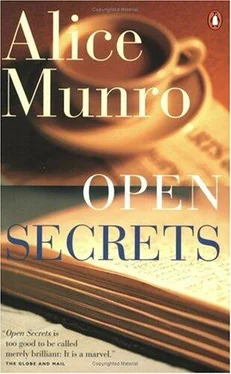But I was not despondent. I had made a desperate change in my life, and in spite of the regrets I suffered every day, I was proud of that. I felt as if I had finally come out into the world in a new, true skin. Sitting at the desk, I made a cup of coffee or of thin red soup last an hour, clasping my hands around the cup while there was still any warmth to be got from it. I read, but without purpose or involvement. I read stray sentences from the books that I had always meant to read. Often these sentences seemed so satisfying to me, or so elusive and lovely, that I could not help abandoning all the surrounding words and giving myself up to a peculiar state. I was alert and dreamy, closed off from all particular people but conscious all the time of the city itself — which seemed a strange place.
A small city, here at the western edge of the country. Pockets of fakery for tourists. The Tudor shop fronts and double-decker buses and flowerpots and horse-drawn rides: almost insulting. But the sea light in the street, the spare and healthy old people leaning into the wind as they took their daily walks along the broom-topped cliffs, the shabby, slightly bizarre bungalows with their monkey-puzzle trees and ornate shrubs in the gardens. Chestnut trees blossom as spring comes on, hawthorn trees along the streets bear red-and-white flowers, oily-leaved bushes put out lush pink and rose-red blooms such as you would never see in the hinterlands. Like a town in a story, I thought — like the transplanted seaside town of the story set in New Zealand, in Tasmania. But something North American persists. So many people, after all, have come here from Winnipeg or Saskatchewan. At noon a smell of dinners cooking drifts out of poor, plain apartment buildings. Frying meat, boiling vegetables — farm dinners being cooked, in the middle of the day, in cramped kitchenettes.
How could I tell what I liked so much? Certainly it was not what a new merchant might be looking for — bustle and energy to raise the hope of commercial success. Not much doing was the message the town got across to me. And when a person who is opening a store doesn’t mind hearing the message Not much doing , you could ask, What’s going on? People open shops in order to sell things, they hope to become busy so that they will have to enlarge the shop, then to sell more things, and grow rich, and eventually not have to come into the shop at all. Isn’t that true? But are there other people who open a shop with the hope of being sheltered there, among such things as they most value — the yarn or the teacups or the books — and with the idea only of making a comfortable assertion? They will become a part of the block, a part of the street, part of everybody’s map of the town, and eventually of everybody’s memories. They will sit and drink coffee in the middle of the morning, they will get out the familiar bits of tinsel at Christmas, they will wash the windows in spring before spreading out the new stock. Shops, to these people, are what a cabin in the woods might be to somebody else — a refuge and a justification.
Some customers are necessary, of course. The rent comes due and the stock will not pay for itself. I had inherited a little money — that was what had made it possible for me to come out here and get the shop going — but unless business picked up to some extent I could not last beyond the summer. I understood that. I was glad that more people started coming in as the weather warmed up. More books were sold, survival began to seem possible. Book prizes were due to be awarded in the schools at the end of term, and that brought the schoolteachers with their lists and their praise and their unfortunate expectation of discounts. The people who came to browse were buying regularly, and some of them began to turn into friends — or the sort of friends I had here, where it seemed I would be happy to talk to people day after day and never learn their names.
When Lottar and the priest first saw the town of Skodra, it seemed to float above the mud flats, its domes and steeples shining as if they were made of mist. But when they entered it in the early evening all this tranquillity vanished. The streets were paved with big, rough stones and were full of people and donkey carts, roving dogs, pigs being driven somewhere, and smells of fires and cooking and dung and something terrible — like rotten hides. A man came along with a parrot on his shoulder. The bird seemed to be shrieking curses in an unknown language. Several times the Franciscan stopped people and asked the way to the Bishop’s house, but they pushed by him without answering or laughed at him or said some words he didn’t understand. A boy said that he would show the way, for money.
“We have no money,” the Franciscan said. He pulled Lottar into a doorway and there they sat down to rest. “In Maltsia e madhe,” he said, “many of these who think so well of themselves would soon sing a different tune.”
Lottar’s notion of running away and leaving him had vanished. For one thing, she could not manage to ask directions any better than he could. For another, she felt that they were allies who could not survive in this place out of sight of each other. She had not understood how much she depended on the smell of his skin, the aggrieved determination of his long strides, the flourish of his black mustache.
The Franciscan jumped up and said he had remembered — he had remembered now the way to the Bishop’s house. He hurried ahead of her through narrow, high-walled back streets where nothing of houses or courtyards could be seen — just walls and gates. The paving stones were thrust up so that walking here was as difficult as in the dry riverbed. But he was right, he gave a shout of triumph, they had come to the gate of the Bishop’s house.
A servant opened the gate and let them in, but only after some high-pitched argument. Lottar was told to sit on the ground just inside the gate, and the Franciscan was led into the house to see the Bishop. Soon someone was sent through the streets to the British Consulate (Lottar was not told this), and he came back with the Consul’s manservant. It was dark by then, and the Consul’s servant carried a lantern. And Lottar was led away again. She followed the servant and his lantern to the consulate.
A tub of hot water for her to bathe in, in the courtyard. Her clothes taken away. Probably burned. Her greasy black, vermin-infested hair cut off. Kerosene poured on her scalp. She had to tell her story — the story of how she came to Maltsia e madhe — and this was difficult, because she was not used to speaking English, also because that time seemed so far away and unimportant. She had to learn to sleep on a mattress, to sit on a chair, to eat with a knife and fork.
As soon as possible they put her on a boat.
Charlotte stopped. She said, “That part is not of interest.”

I had come to Victoria because it was the farthest place I could get to from London, Ontario, without going out of the country. In London, my husband, Donald, and I had rented a basement apartment in our house to a couple named Nelson and Sylvia. Nelson was an English major at the university and Sylvia was a nurse. Donald was a dermatologist, and I was doing a thesis on Mary Shelley — not very quickly. I had met Donald when I went to see him about a rash on my neck. He was eight years older than I was — a tall, freckled, blushing man, cleverer than he looked. A dermatologist sees grief and despair, though the problems that bring people to him may not be in the same class as tumors and blocked arteries. He sees sabotage from within, and truly unlucky fate. He sees how matters like love and happiness can be governed by a patch of riled-up cells. Experience of this sort had made Donald kind, in a cautious, impersonal way. He said that my rash was probably due to stress, and that he could see that I was going to be a wonderful woman, once I got a few problems under control.
Читать дальше













